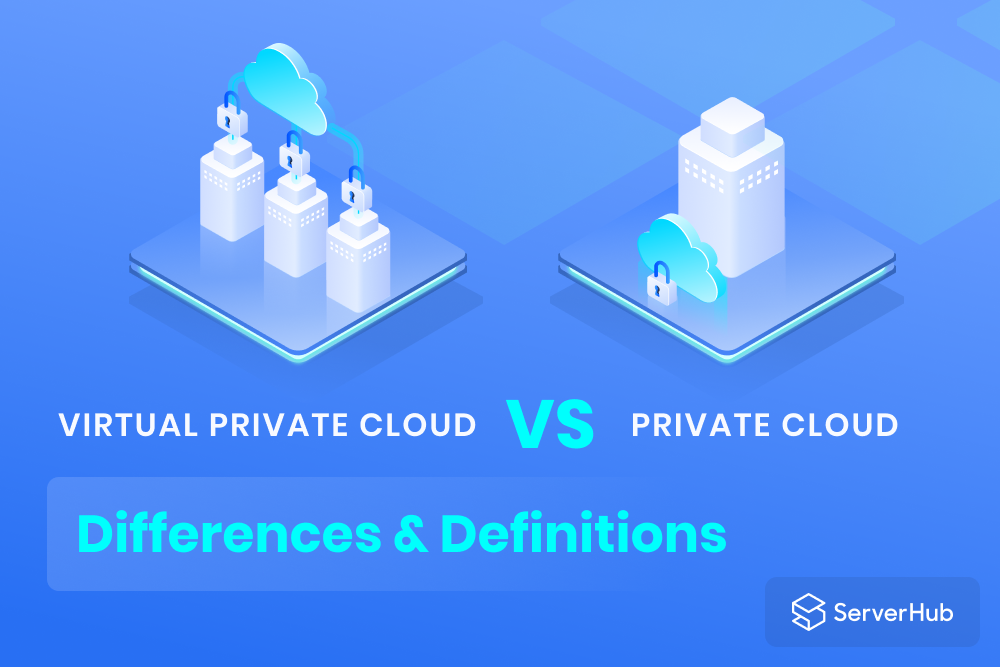We’ve all been there, asking the same question over and over. Can just one other word make so much difference?
The lines between the private cloud and the virtual private cloud are blurring more than ever. Still, they differ in terms of provider, architecture, and resource delivery.
Luckily you can decide between both based on these distinctions.
Without further ado, let’s dive into it!
Private clouds: what to expect
Private clouds stand by their name as a computing service offered through the internet, exclusively provided to one organization, and dedicated to fully-protect it from any harm.
Unlike a public cloud’s often misassumptions of its expectation vs. reality. A private cloud is direct to the point, only available to a set-of selected users (single-tenant environment).
The internal/corporate/private cloud is easy to scale up. Therefore, it can provide:
- Scalability: providing extra services without extra configuration to be required by the IT team
- Self-service: granting users the ability to access the private cloud without IT complexities.
You better know that your own IT department will be held accountable for any failures and met with many complexities. So, you should invest smartly into the management, staff, and other maintenance expenses.
Benefits of private cloud
With optimal security and customization control, the advantages of a private cloud may include:
Full software/hardware choices control: choose what you prefer, not what a cloud provider offers.
Full conformity and flexibility: customers aren’t forced to obey a cloud service provider’s administration
Don’t forget to keep in mind that one of the most distinguished traits private clouds enjoy is the high privacy/security level, protecting you against any potential attacks or from sensitive data leaks to third-party providers.
Alongside elasticity and additional control, using the dedicated resources hosted on-premises.
Cloud services for private clouds
Two cloud services models are applicable for a private cloud, which are the IaaS and the PaaS.
Platform-as-a-Service (PaaS): where a third-party provider develops platforms and exposes them to customers over the internet. As if you’re buying the tools you need to build your house by yourself.
Infrastructure-as-a-Service (IaaS): where a third-party provider hosts virtualized resources online to customers. As if you’re renting land to build your house on, but still need your own building equipment to do so.

Private cloud and the next level
Capable of running virtual machines, private clouds are a solid choice to maximize hardware usage.
Still, private cloud users will need more public cloud features and will often mix both the public cloud and private cloud to develop a hybrid cloud that can have the necessary elements to meet all their needs.
Deploying a hybrid cloud is essential for ultra-efficiency purposes, and will benefit you greatly by freeing up space using cloud bursting.
Virtual private cloud (VPC)
A virtual private cloud is a private cloud within a public cloud, reinforced with security/isolation aspects using public cloud resources.
Same as the private cloud, you’re only allowed to access it if you’re the one who made it or a part of the people invited inside (multitenancy).
The VPC comes backed with scalability, agility, exquisite performance, and easy hybrid cloud deployment using an application programming interface (API). Thus, Making-your business inevitably one step closer to perfection.
What isolates a VPC
With firewall functions that provide filtering capabilities, here’re the technologies behind the VPC isolation:
Subnets: You reserve IP network addresses so you can come back later to, which are ultimately only yours to command, away from the evil public internet world.
VLAN: VPCs can be isolated through some devices connected to a local area network, which means having a connection that is there without the use of the internet.
VPN: mostly used to access region-restricted websites or to shield your browsing activity. VPNs isolate a VPC using encrypted traffic. A virtual private network (VPN) passes through a publicly shared Internet infrastructure that’s not visible to anyone but you.
VPC top benefits
Most viable and valuable VPC scenarios come into play when you need the following:
Guaranteed customer satisfaction: a VPC helps you build brand trust/customer loyalty, and therefore gain more traffic and achieve other strategy goals, with an uptime ratio up to 99.99%.
Exceptional security: a VPC offers you a complete data separation from your provider’s other clients unless you give them access, protecting all your valuable information from potential leaks to the wrong hands.
Customize all you want: with complete control over your network, VPCs allow you to connect to your enterprise at any time you wish to, add segmentations based on your mere desire, and become more agile than ever.

Challenges VPC users to face
Like all the beautiful things in the world, they pack a punch when they come with a bit of excitement. Rare but possible at the same-time VPC challenges might include:
1-Complexity issues when trying to manage and configure the VPN of the VPC you are using. Therefore, you should have a pretty solid IT team for viable incidents.
2-VPCs, no matter how great they may seem, are still hosted outside the enterprise’s data center. This exposes some strict compliance businesses to data and application limitations.
Virtual private cloud vs. private cloud: you don’t have to choose
Although they are often used by financial institutions, government agencies, or other organizations with critical operations seeking more and improved control over their environment.
The utter truth is that no one specific type of cloud computing can be considered the right choice for everyone and will always depend on each entity’s needs.
As technology progresses faster than ever, several other cloud computing models and services have evolved to meet the fast-changing individualized needs of organizations.
There will be ups and downs for every cloud deployment model, but the three main service models for deploying a cloud service are a private cloud, public cloud, and hybrid cloud.
Strategize, organize, and study both your needs and your competitors as hard. That way, it’s easier to grasp the ultimate end goal and move swiftly towards it using the perfect deployment method, mainly directed and guided by your unique business needs.
